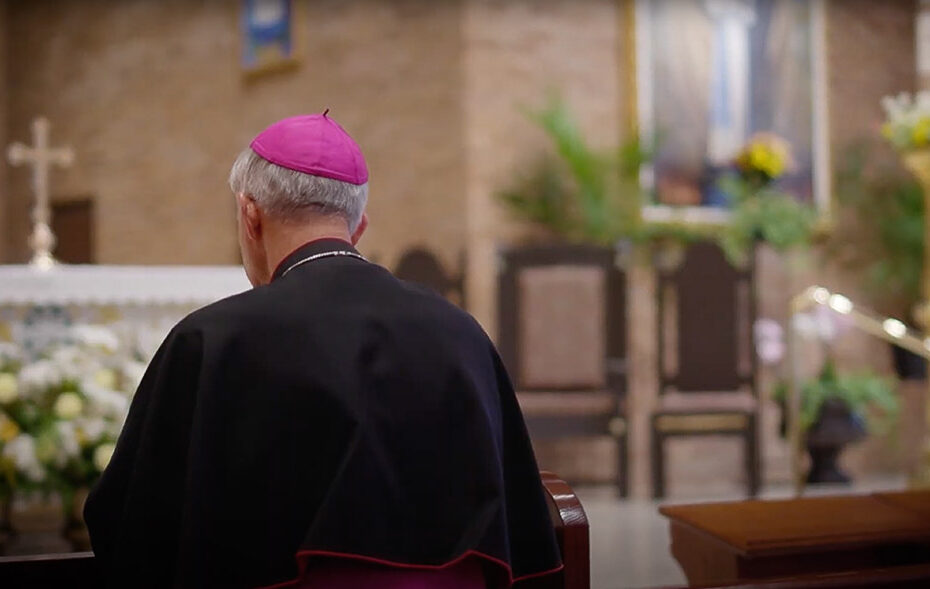By Judie Brown
When Pope Frances removed Bishop Joseph Strickland, the shock was overwhelming, as was our sadness. The event immediately reminded me of a lesson I learned from our first spiritual director Father Denis O’Brien, who explained that bloodless martyrdom is the sacrifice of one’s self for the love of Christ, Truth, and the Church. That defines Bishop Strickland perfectly.
Once you listen to the interview Bishop Joseph Strickland did with LifeSiteNews founder John-Henry Westen, you will hear and see the holiness and character of a man of God who, even in this time of duress, is devoted to Truth. Bishop Strickland’s presence and his words radiate a peace that only Christ can provide.
Looking back now, we realize that the visitation by two bishops to the Diocese of Tyler, Texas, was designed by the Holy Father for a single purpose. If that had not been the case, he would not have sent two bishops who, among other things, do not uphold Canon 915. That Church law states: “Those who have been excommunicated or interdicted after the imposition or declaration of the penalty and others obstinately persevering in manifest grave sin are not to be admitted to holy communion.”
Both bishops—Dennis J. Sullivan and Gerald F. Kicanas—have been silent on their obligation to defend Christ from sacrilege by denying the Eucharist to public figures who support abortion, contraception, and homosexual acts, among other sins. This alone explains a lot about why the pope chose them.
Kicanas actually said the question of formal cooperation in an abortion has not been answered by the Church. This is the public posture of many bishops who see no reason to obey that Church law, and this of course puts them at odds with Truth.
On the other hand, as Kevin Wells wrote of Bishop Strickland, he “now has no home. Happily, though, he knows that what appears ‘losing’ in this world is actually the Lord’s way of ‘winning.’ Those who engage in the necessary and relentless work of shouldering Christ’s cross are those closest to the agonized face of Ecce Homo. Bishop Strickland’s home now, in a real way, are the forlorn places in the landscapes of the Sorrowful Mysteries of the rosary.”
Some have suggested that the pope removed Bishop Strickland because of his tweet that Pope Francis was “undermining the deposit of faith.” But the bishop’s Twitter/X feed is no longer visible, which as I see it is part of the effort to erase all evidence of Strickland’s character from public view.
Sounds like a conspiracy to me, and I for one never buy into such things, but on the other hand the tweet is now gone. You decide!
What is most interesting to me about this chain of events are the comments written by Father Jerry Pokorsky. He wrote about the four tiers of clericalism, which expose the problems involved with such a position. For those who are unaware, “Clericalism is an exaggeration of the role of the clergy to the detriment of the laity. In a culture of clericalism, clerics are put on a pedestal and the laity are overly deferential and submissive to them. (I would be remiss if I did not also point out that he includes bishops and deacons as clerics in this definition.)”
In analyzing the situation with Bishop Strickland, Father Pokorsky said, “Bishop Strickland never played the Tier Two game. His witness to Catholic orthodoxy was unabashed, vocal, and occasionally reckless. He was ‘Tier Three and proud!’ (to coin a slogan). He ‘disrupted the process’ of Tier One and became a target for removal. He has become Tier Four, at least for the moment. His removal is a study of institutional clericalism.”
A humble man, Bishop Strickland never attempted to use his ordination to the priesthood or elevation to the role as bishop as a cudgel with which to keep his sheep in line. He truly is the perfect example of a good and holy shepherd.
And one final thought on this situation as of today. The Catechism of the Catholic Church (938) states, “The bishops, established by the Holy Spirit, succeed the apostles. They are ‘the visible source and foundation of unity in their own particular churches,’” a reference to the Dogmatic Constitution of the Catholic Church, Lumen Gentium. That document explains that unity is expected among the bishops, which includes the pope.
It seems to me this unity has been fractured by the pope’s action in relation to Bishop Joseph Strickland. But, as we know, the Lord has the final word, and so we pray for Bishop Strickland and the pope, and we ask the Holy Spirit to enlighten all those involved in this very sad situation.
Bishop Joseph E. Strickland, we admire you, we love you, and you are constantly in our prayers.
